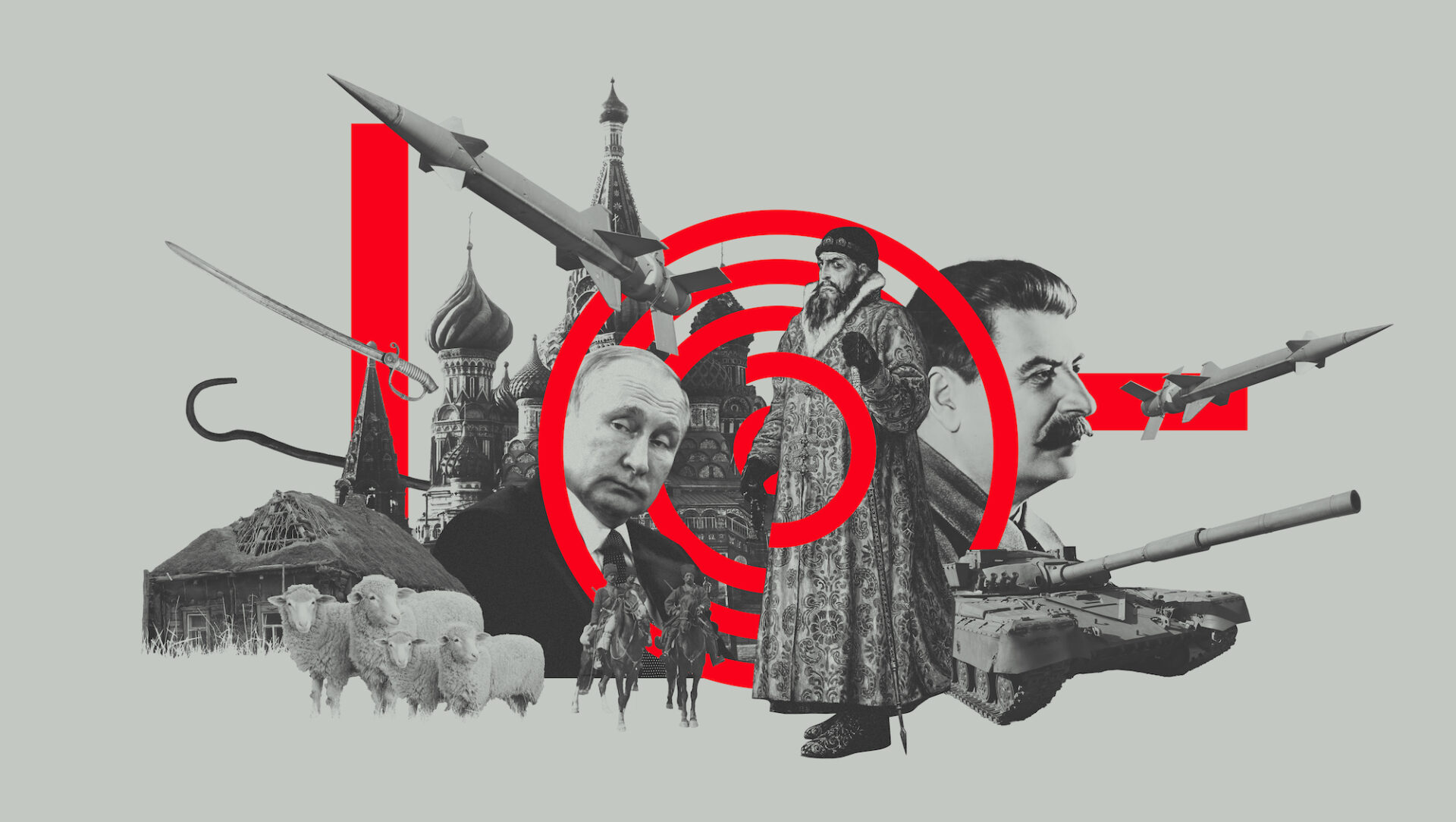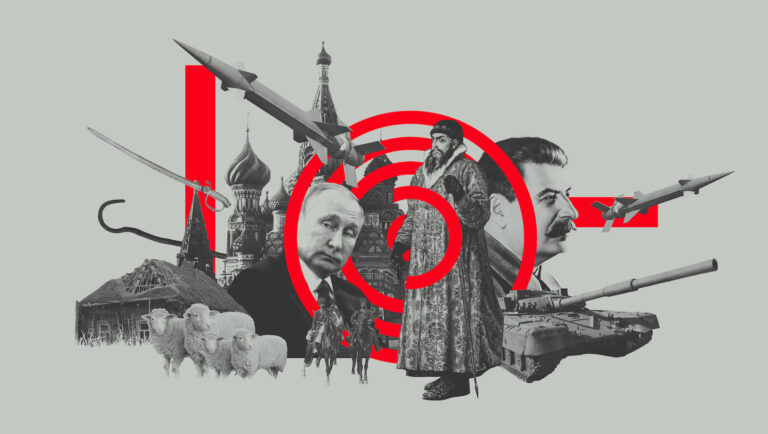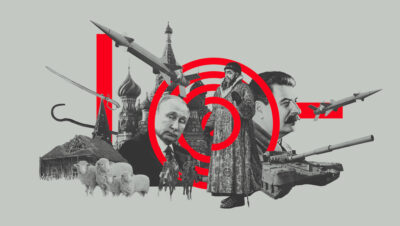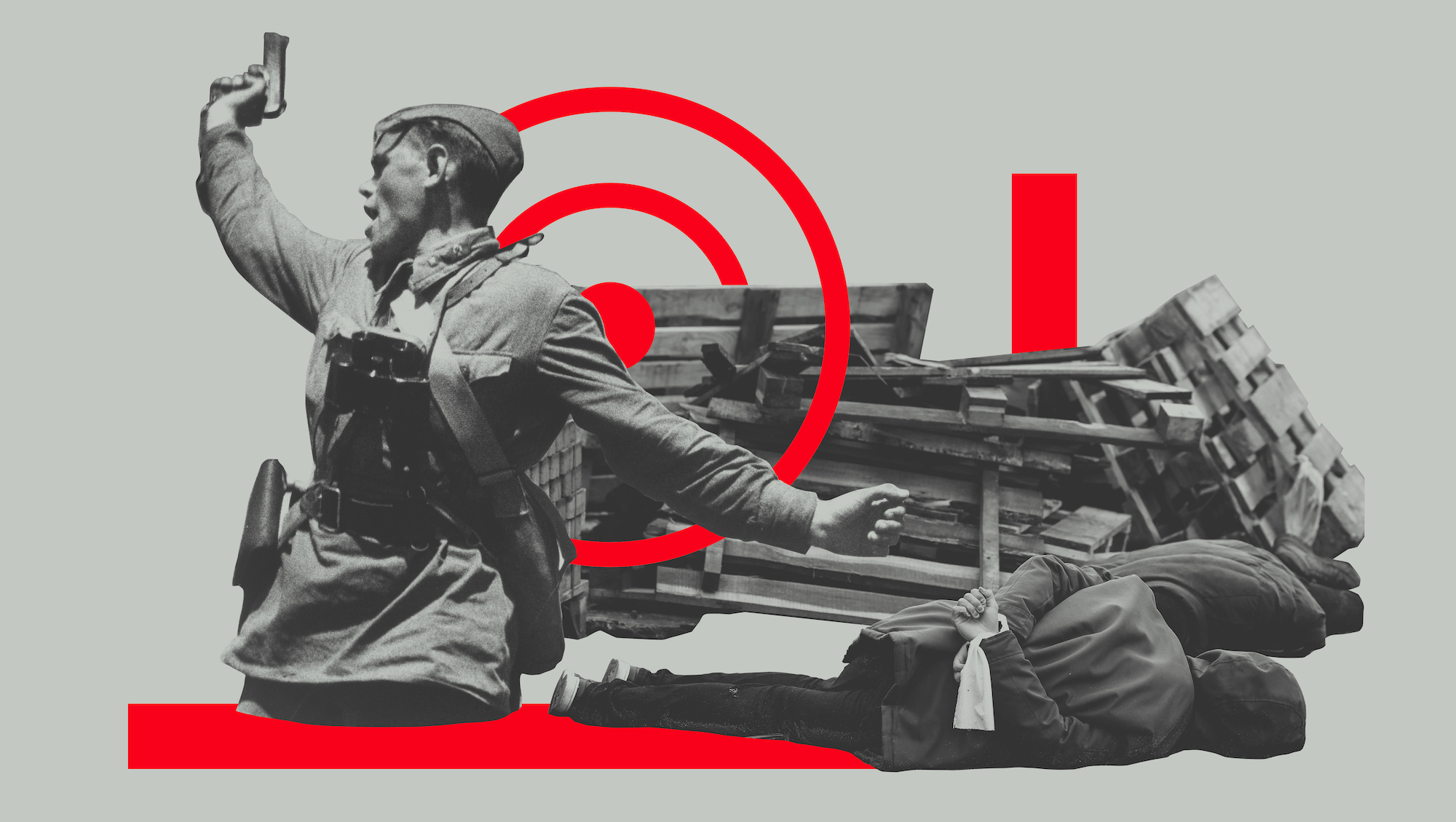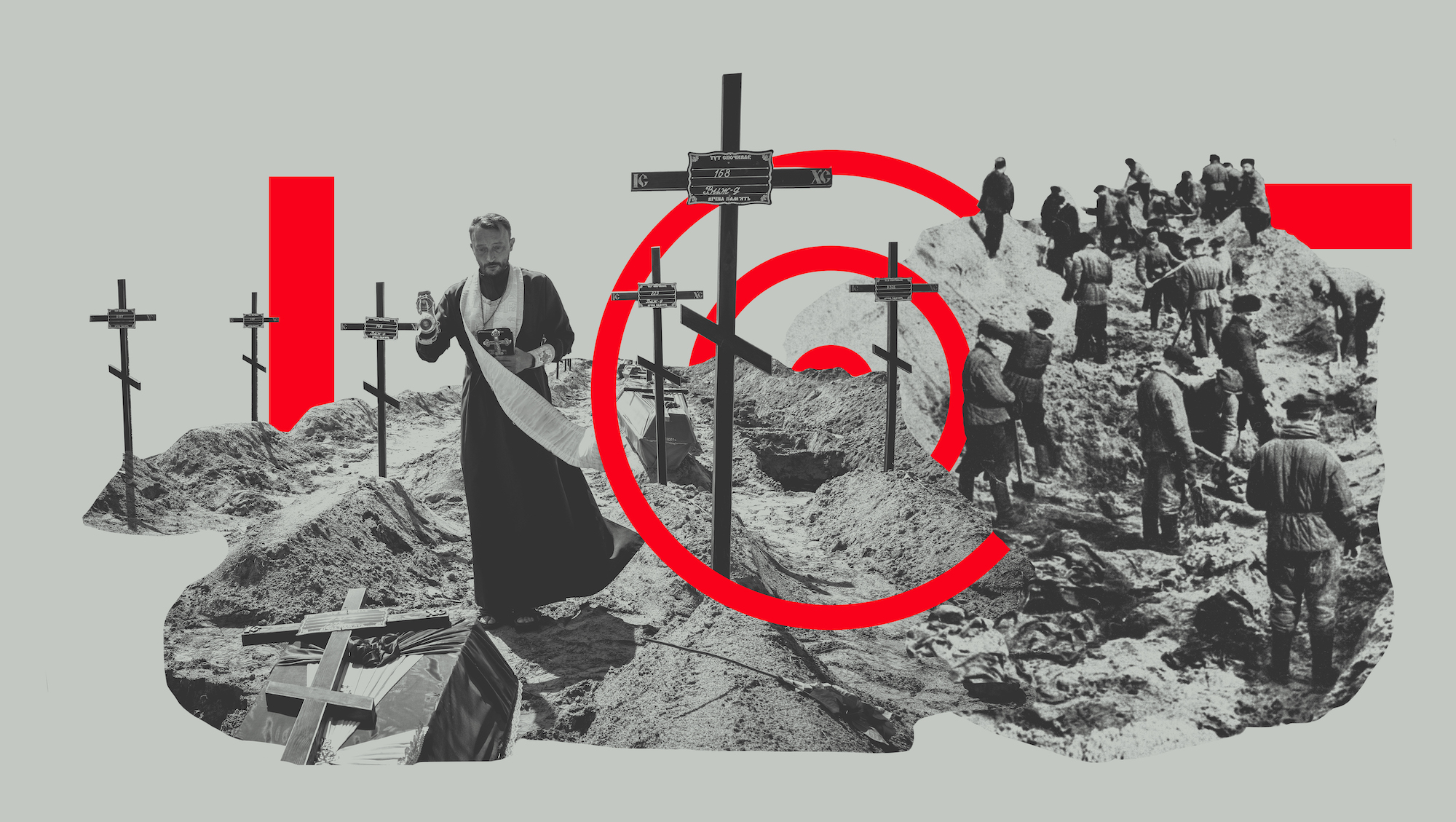„I thought they’d go right back to their old rhetoric, but the past manifesting anew in a cruder and more robust way was unexpected,“ Peeter remarks. Deportations. Rapes. Alleged struggles with hostile elements, but actual executions of children.
Official polling paints a clear picture of Russian society’s true convictions.
„They come off as children who have been wronged and are now seeking revenge,“ Jauniškis adds. He claims the Soviet way of thinking is so deeply embedded in Russian society that even their manner of resistance still dates to the 1970s: people sit in their kitchen, drink vodka, and complain, but as soon as they leave their apartments, they report to their jobs and work obediently till evening. Nevertheless, Mežviets says this conqueror’s mentality is no mere Soviet remnant, but extends far deeper.
Surprisingly, the heads of all three Baltic counterintelligence agencies answer with the same name when I ask about the origins of Russia’s present-day mentality: Ivan the Terrible. A ruler who lived almost 500 years ago, conducted successful military campaigns aimed at territorial expansion, and stood out for his exceptional cruelty, even slaying his own son in a fit of rage. Russia’s modern-day brutality and expansionism is a carbon copy of Ivan the Terrible’s murderous imperialism.
Regarding the former grand prince of Moscow as the root of modern Russia isn’t a mere figment of Baltic counterintelligence’s imagination. Peeter recently read a lengthy Russian propaganda article lauding Ivan the Terrible as a genius and role model. Russia has increasingly used historical events to justify its present actions, erecting, for example, monuments with a White Army and Red Army soldier standing side by side and a plaque reading: „Both fought for Russia.“ Peeter almost snorts and laughs when he tells me.
The pair is absurd in a historical context, but anything is possible in Russia. Imperialism, perpetual expansion coupled with nationalism, centering Russians themselves in everything – there, such absurd bedfellows are able to nestle together and make ordinary development impossible.
Sinisalu isn’t the only history buff in Estonian counterintelligence: Toots can trace his genealogy back 300 years and is uncharacteristically enthusiastic when he starts telling me about his ancestors. One of his grandmothers descended from aristocratic Baltic Germans and distrust is no unfamiliar topic: a rift formed in the family when she decided to marry an Estonian, who were simple peasants at the time. Toots has carefully preserved every scrap of correspondence related to the story.
Russian intelligence officers are no less interested in history, albeit a warped version.
„Over the last few years, they’ve vigorously emphasized shaping the present through history,“ says Mežviets. And to a Russian intelligence officer, „history“ primarily means conflicts and war. Long-ago clashes are used to justify fighting today, and according to Peeter, Russian intelligence officers receive „a special dose“ of these lessons, fueling not only their desire to expand, but to exact retribution.
Disappointment of falling behind the West has caused Russians to either ramp up national exceptionalism or take offense, grow embittered, and believe that the country has been robbed of something. As one Russian acquaintance tells me, „Russians aren’t interested in truth, but justice.“ No matter that this historical justice is nothing but a paper-thin fantasy.
One needn’t dig very deep into colonial history to understand modern-day France. Russia is a different case. All is but a continuation set to the rhythm of the past. Today’s Russian security forces are astonishingly identical to their predecessors established centuries ago, and even the country’s primary propaganda methods were perfected in tsarist times. Russia’s wars in Syria and Afghanistan were conducted the same way as the Great Northern War (1700–1721) and the Livonian War (1558–1583). Tanks have replaced swords and soldiers wear combat boots instead of spurs, but their intentions, behavior, and perhaps even some of their equipment are centuries old.
The cruel culture pervading Russia’s modern army was entrenched during the era of Stalin’s Gulags. It isn’t random, but systematic. Rigid hierarchies, an inability to account for variation, autocrats locked in information bubbles, and, at the same time, a population yearning for autocracy – perhaps the hardest aspect for Westerners to wrap their heads around – have existed in Russia for centuries and will only persist.
Baltic counterintelligence directors don’t only speak about Putin, but recall the reign of Peter the Great, who ordered all Swede-supporting Russians to be executed. Again, Sinisalu and Toots chime in together with a Russian maxim: „Beat your own to frighten others.“
„Violence is a historical pattern in Russia, and that will not change,“ Sinisalu calmly adds. „Human life has no value there.“
The massacre in Bucha wasn’t unique, but a repetition of Katyn. The detonation of the Olenivka prison was a copy of the explosion in Sambir, which killed 1,200 female prisoners in 1941. Nothing has come as a surprise for anyone familiar with Ukrainian history, as Ukraine isn’t simply Ukraine – it is also Estonia, Latvia, and Lithuania in the 1940s.
They Aren’t Like Us
„They only respect force,“ says Jauniškis, „and if you answer theirs with your own, then you might even become friends.“ The principle is diametrically opposed to the suit-and-tie diplomacy and ordinary negotiations to which the West is accustomed.
„For Russia, both sides winning equals a loss,“ remarks an Estonian entrepreneur who has organized complex business transactions with Russians for decades. „They need for there to always be winners and losers, even when negotiating.“ And only they may come out on top.
„There, diplomacy is a sign of weakness,“ says Mežviets. „Russia only recognizes force. It’s hard for the West to understand, as Westerners hold different values and believe that others do as well.“
Jauniškis compares contemporary Russian society to the medieval Mongols. Though Lithuania once joined forces with Russian princes to counter the Mongolian hordes, he feels that Russia switched sides given the behavior of its officers and soldiers alike. „They’re animals,“ he frankly states.
„I don’t want to think so primitively; to believe such evil could truly exist in Russian society,“ Peeter tells me. „I’d like to believe something nobler. But it’s simply the truth.“
Jauniškis is well aware that such statements are not politically correct. It has nothing to do with national characteristics or all Russians being bad eggs, of course.
„For generations and generations, people in Russia have been born into fairy tales where life is terrible, and they’ve almost never enjoyed the freedom of expression, so what else can you expect?“ says a human rights activist who refuses to strip the entire population of its human face. We must speak not of Russians, but Russian society.
Constantly, we’re told that Russia is composed of ingredients like Chekhov, borsht, generosity, fraternity, piousness, and Dostoyevsky. But let us recall what Dostoyevsky wrote: a Russian can only operate in radicals, being radically good or radically evil. One of his protagonists allows a „thoroughly native object to be seen – an enormous fist sinewy, knotted, and overgrown with a sort of reddish fuzz, and it became evident that should this profoundly national object descend upon anything it would leave nothing after it but a damp spot“.
Sinisalu is an avid reader of Lyudmila Ulitskaya and watches all her interviews. He was initially surprised that although the writer heatedly opposes the war, she didn’t leave Russia before it broke out. „But, well, then I took a deeper look and realized she’s not a real Russian, but a Jew.“ And what do they say about Jews in Russia? As one of Sergei Dovlatov’s characters is told: „I’d give a dozen Ukrainians for one Jew.“
Contempt for Ukraine isn’t just one of Putin’s delusions – its roots stretch much deeper. Before interviewing a well-known Russian theater director, I was warned he is generally a liberal anti-Putinist but believes that Russia occupying the Crimea was the right move, as Ukrainians „aren’t human“.
When discussing Russia, Jauniškis repeatedly uses the words „unique mentality“. Russia does not belong to our ecosystem. It has its own set of rules and values. Even the jokes are different. Baltic counterintelligence officers often try to tell their Western colleagues Russian jokes, but fail to get a laugh because they can’t see how such things could be funny. Only those who have been raised in the Baltic sphere can laugh at both the anecdotes told here and those told in the West.
„It’d be overly simplistic to attribute the Russian mentality to propaganda,“ says Jauniškis. „Imperialism, chauvinism, brutality – they’re a part of Russian education, upbringing, and culture, but are also part of their values. And it’s been that way for centuries.“ Alas, neither Jauniškis nor any other Baltic counterintelligence officer I interview believes it can change.
Nothing Changes
When the Baltic states regained their independence in 1991, Russia also became temporarily more democratic. Elections were seemingly held, leaders spoke of opening up, and everything appeared to be changing for the better. But only the West believed Russia had taken a turn.
„When we made our plans, we assumed that Russia would go back to being its old self and the empire would return at least a year later,“ said Raivo Vare, who served as Minister of State at the time. He’s had a lifelong interest in Russia and lived there for 17 years. „Practical experience“ was the basis for the assessment.
„Alas, we were overly optimistic,“ Vare adds. It only took a few months before Russia began manipulating Estonia again, this time with oil.
Everyone who works for a Baltic counterintelligence agency asserts that nothing will change.
„In Russian schools, they teach children that the Baltic states have only been lost temporarily,“ Peeter remarks. He wraps his hands around his coffee mug before continuing. „Pushkin can’t lead a country like Russia.“ Peeter doesn’t believe anything would improve even if Aleksei Navalny were, by some miracle, to become Russia’s leader. „The mentality is the same. There would need to be a total purge, but that won’t happen.“ Russia’s youth have abandoned hope, the state apparatus is massive, protests lead nowhere, and all the West’s long-held hopes for a peaceful democratic transition are utterly naïve, overlooking Russian history, its mindset, and reality.
Just recently, Estonian Ambassador to Ukraine Kaimo Kuusk stood at the edge of the mass graves and visited the former torture chambers in Izum. He was told that the Russian torturers weren’t yokels, but spoke in elegant urban St. Petersburg or Moscow accents. Russia’s total defeat in Ukraine is the sole opportunity for change.
„Historically, force has always had an effect on Russia,“ Peeter says. „No matter how much you wish there was another solution, there isn’t.“
„At the moment, I can’t think of any force that could spread democratic values in Russia,“ says Jauniškis. „They demand the respect of every other country and exact it through brutal compulsion.“
Mežviets presses his palms together and dispassionately lists the bullet points of Latvian counterintelligence’s strategic assessment. Russia will not conquer Ukraine. Putin’s mentality will begin to shift, but no one can say when. It depends not only on himself or Russia, but on the West’s level of activity. Here, Mežviets briefly pauses.
„Nevertheless, Russia’s mentality will not change,“ he concludes. „Not even Putin’s death will change anything. To our region, Russia will always be a threat, and not only because of its leaders.“
The directors of all three Baltic counterintelligence agencies perceive that Russia’s invasion of Ukraine did not herald a change in the former, but it certainly did in the West. Now, Western politicians are gradually starting to comprehend that Russia cannot be treated the same way as other states, though it is a very fine line to tread. People still refer to „Putin’s war“. They emphasize that „ordinary Russians“ should not be persecuted. They assert that we must remain humanist and understanding, for otherwise we would not be European.
It’s a contradictory cocktail that requires, in the name of Western values, convincing ourselves that Ukrainian corpses are merely the act of a crazed war-waging fanatic, not the outcome of a much broader, tenacious mindset that has gone unpunished for centuries. Many are prepared to allow Putin to save face, no matter that the cost is Ukrainian bodies with nooses tied around their necks and their faces removed.
Of course, Russia isn’t the only country that proceeds from a historical narrative.
„Roosevelt was also naïve,“ says Sinisalu, noting how the former president sacrificed the Baltic states in an effort to win over Stalin as an ally. He recalls the indignation that erupted in American audiences after watching a Latvian film that compared communists to Nazis. „The West has shown a lot of cynical self-interest,“ says Sinisalu. „The political leadership always makes the rules: you have to keep communicating with Russia somehow.“ When I ask what feelings the West’s approach elicits, he shrugs. „What could they be? Not positive, in any case.“
Sinisalu acknowledges that attitudes in the West have improved since the beginning of the war, but not enough. He calls any references to „Putin’s war“ or suggestions that Russia should avoid humiliation „a stupid thing to say“. Being well-versed in history, he knows all too well that revolutions have only happened in Russia after a war was lost.
It’s possible that the Baltic state security agencies will soon lose their exact knowledge of Russian society: younger generations have had contact with local Russian speakers but not Russia proper, which is something entirely different. It’s not a question of ethnic nature, but nurture. Today’s Baltic youth generally do not speak Russian, cannot pick up on nuances, and may err in the details.
„I’m a relic,“ says Toots.
Will the new generation bring naivete? I ask.
„No, on the contrary,“ Jauniškis responds. „They have the experience of the generations that came before them.“
Russia’s espionage in the Baltic states has slightly weakened since the war began, but my interviewees believe it is only temporary.
„My job has been relatively routine for the last 15 years,“ Toots casually remarks. He calls catching the adversary’s spies „assembly-line work“ and his own profession a „lifestyle“. There haven’t been any shifts on a larger scale, he says – the only surprises are tactical in nature.
When I interviewed Toots early in the summer of 2021, he spoke about Russia’s efforts to spread influence in schools and transit businessmen who were vying for better ties to the colossal empire. A year later, everything has changed. The adversary’s tools have changed, but vigilance is still crucial. „If you go into anything expecting them to be just like us, then you’re setting yourself up for disappointment.“
During the Soviet occupation, Toots spent time working in a missile division stationed in Ukraine. Once, they were ordered to construct a large, paved launch pad. They were supplied with no gravel, asphalt, or a single piece of equipment. They didn’t even have vodka that could be traded for supplies. Against all odds, it was finished two days later. The division stole the steamroller and scraped the rest of the materials together from who-knows-where.
„You’ve got to be creative,“ is all he says.
The weekend after the invasion of Ukraine, Toots was scrolling through Soviet propaganda posters from the Second World War and came up with an idea. He called a few colleagues, had some quick discussions, and was sending files to a print house by Sunday evening. Several days later, posters appealing for tips and warning of possible recruitment attempts by Russian intelligence officers were put up at Estonia’s border checkpoints. How successful was the campaign? I ask.
„I have a selective memory,“ he replies with a smirk, though he acknowledges an astonishing number of tips poured in.
Toots postpones one of our meetings by several weeks.
„Toots isn’t here,“ is all the KAPO press representatives will tell me.
„He’s busy in Narva,“ Sinisalu adds tersely. That’s to be expected. He was on alert in Eastern Estonia – his childhood stomping grounds – while a Soviet-era tank was moved from a pedestal in Narva to an open-air museum.
Toots isn’t particularly agitated when he returns. Everything went according to plan, which doesn’t mean it was easy. Apparently, Russian intelligence wasn’t very active during the contentious removal. KAPO did, however, had to employ the only means of quelling possible unrest: semi-forcibly bringing in certain „necessary individuals“.
It’s possible that Toots put on a Russian-language record when he got home from Narva. He’s a fan of Russian music and would gladly talk to colleagues about Kino or Akvarium, though there are more historians than music aficionados in their ranks. We meet a total of three times and Toots speaks about Russia at length, but barely says a word about himself.
„Maybe these are the last interviews I’ll ever give,“ he says.
Over the last dozen years, Toots’s unit has caught and arrested 21 Russian spies, each of whom was found guilty. I suspect he’s hinting at another capture as we conclude our conversation and he says: „Just wait a bit. There’ll be news before the year is over.“
Lithuanian counterintelligence doesn’t make a similar promise, but there is no shortage of Ukrainian flags on lapels in Vilnius. A few weeks after the invasion, Jauniškis’s father said he would have never believed he’d see another war in his lifetime.
„One day, Russians will wake up and realize what they’ve done,“ Jauniškis asserts. „And their guilt will be excruciating.“
When I leave the Latvian VDD headquarters and am returned the pens that were confiscated from me, I ask the security guard if work has been busier than usual. He nods, but doesn’t say a word.
I drive back to Estonia. A few days later, we celebrate my great-aunt’s birthday. She’s turning 100. Her children say she’s in good shape, still as sharp as a tack, and climbed up onto the roof to teach the chimneysweep a thing or two just a few years ago. However, she hasn’t slept well since February 24th. Insomnia struck after reading the news of Russia’s invasion of Ukraine.
„She’s afraid,“ say her children. „She’s afraid the rapists will come back again.“
Eero Epner is a dramaturge, an art historian and freelance journalist from Estonia.
Translated by Adam Cullen
The article was originally published on Eesti Ekspress

